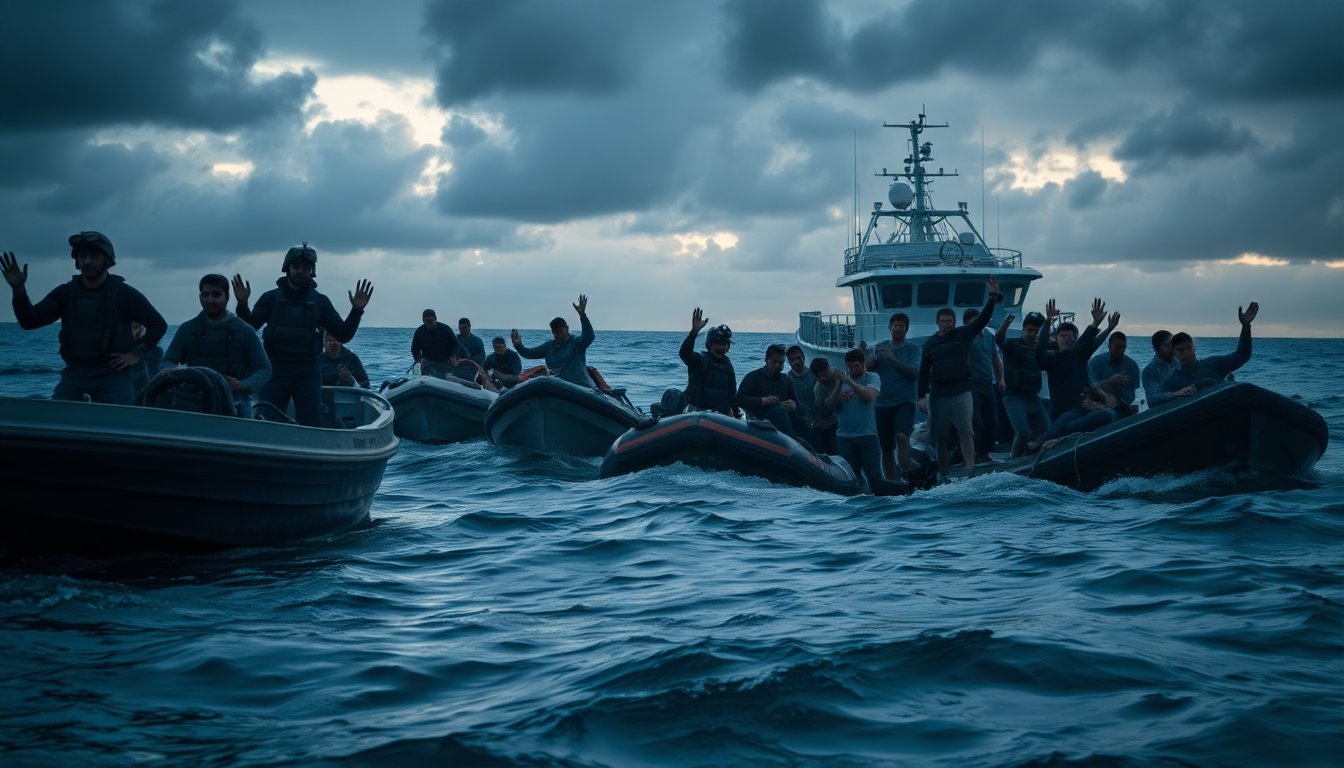Table of Contents
The situation surrounding the Gaza aid flotilla escalated significantly when the Israeli military intercepted nearly all of the 40 vessels involved in a humanitarian mission. This operation resulted in the capture of over 450 foreign activists, among them the well-known Swedish environmentalist Greta Thunberg. As tensions mounted, live footage broadcast from the boats showed Israeli soldiers, equipped with night vision goggles, boarding the ships while the activists raised their hands in surrender, wearing life vests.
A clip released by the Israeli Foreign Ministry shows Greta Thunberg surrounded by soldiers on the deck of a ship, underscoring the gravity of the situation. In a pre-recorded message shared following her interception, Thunberg declared, “If you are watching this video, I have been abducted and taken against my will by Israeli forces. Our humanitarian mission was non-violent and abiding by international law.” This statement has significantly highlighted the flotilla’s cause.
Global reactions to the interception
In response to Israel’s military actions, pro-Palestinian demonstrators took to the streets in various cities across Europe and beyond, including Karachi, Buenos Aires, and Mexico City. These protests were not merely spontaneous; they reflected a growing discontent with Israel’s ongoing operations in Gaza, which have lasted nearly two years. In Italy, labor unions announced a general strike in protest of the flotilla’s interception.
The ongoing mission of the flotilla
Despite the interception, one vessel named the Marinette continued its journey, remaining approximately 150 kilometers from Gaza. The flotilla’s organizers maintained a live stream, showcasing the crew’s determination to proceed despite the challenges. The Israeli Foreign Ministry confirmed that all detained individuals were being transported to Ashdod and that they were safe and in good health.
The ministry reiterated its stance, warning that any remaining vessels approaching the blockade would face similar actions. They emphasized that their operations were conducted under what they deemed a lawful blockade.
Activists’ perspectives and future actions
Among the activists was Nikita Stapleton, a Canadian aboard the Conscience vessel. Stapleton stated that while the interception was anticipated, it would not deter their mission. “We expected this, unfortunate as it is. Our resolve remains unshaken,” Stapleton said, highlighting the commitment of the Freedom Flotilla Coalition, which includes not only activists but also medics and journalists.
Activist Sadie Mees echoed similar concerns, emphasizing that their mission seeks to highlight the dangers faced by humanitarian workers and journalists in Gaza. Human rights organizations have consistently raised alarms regarding violence directed at these individuals amid the ongoing conflict.
International condemnation of Israeli actions
The interception sparked widespread condemnation from leaders around the world. South Africa’s President Cyril Ramaphosa characterized the operation as a significant violation of international law, urging the immediate release of South African nationals involved, including a grandson of the late Nelson Mandela.
Turkey’s President Recep Tayyip Erdogan criticized the Israeli government, claiming its actions demonstrate a blatant disregard for peace efforts. He condemned the aggression directed at the flotilla, which aimed to deliver aid amid the ongoing humanitarian crisis in Gaza.
Similarly, Colombian President Gustavo Petro responded by expelling Israel’s diplomatic delegation and terminating Colombia’s trade agreement with Israel. This action followed the detention of Colombian citizens aboard the flotilla, highlighting the escalating tensions surrounding the situation.
The broader implications of the flotilla’s mission
The flotilla, which departed in late August, is transporting essential supplies, including medicine and food, to alleviate suffering in Gaza. This initiative marks a significant movement against the Israeli blockade, involving over 500 activists from diverse professions, such as parliamentarians and lawyers. Their mission has attracted substantial international attention, receiving support from countries including Turkey, Spain, and Italy.
Despite various challenges, the flotilla’s mission symbolizes a rising wave of global solidarity aimed at addressing humanitarian needs in Gaza. The activists’ resolve highlights the ongoing struggle for access to aid in the region, emphasizing calls for international support and intervention.
As events continue to unfold, it is crucial for the global community to respond to the humanitarian crisis in Gaza while advocating for peaceful solutions to the ongoing conflict.


